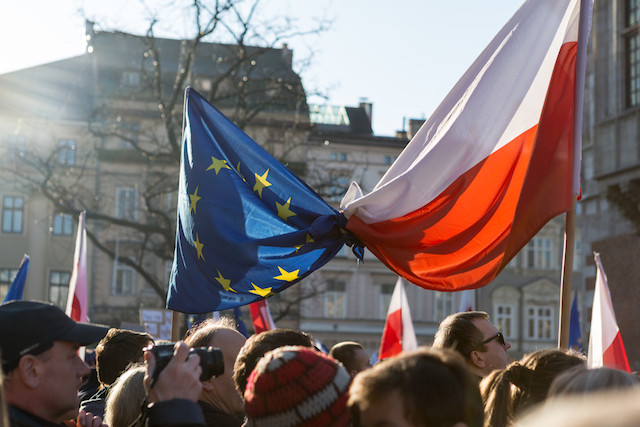Zuzanna Karas was looking forward to two things last year--the birth of her first child and receiving her Luxembourg passport. For the Polish lawyer, who moved to Luxembourg in 2010, the two are closely interlinked--becoming a Luxembourger will be the feature that unites her, her Italian partner and daughter, Julia.
But, the actions of ruling right-wing populists the Law and Justice (PiS) party and ongoing government stand-offs with the European Commission lend the Luxembourg nationality another meaning--particularly if Poland leaves the European Union.
Closing on Europe
“We laugh that Poland will more likely be kicked out [of the EU] than have an exit,” Karas tells Delano. While she admits she doesn’t think it will happen, Karas is nevertheless concerned about the changes she has seen in her native Poland since the PiS came to power in 2015. The country is under fire for its pollution levels, compounded by a determination to continue mining coal, it violated EU laws by logging ancient forests and was referred to the European Court of Justice for a law forcing judges into early retirement.
President Andrzej Duda justified the the move saying: “We have a situation where some elitist judges consider themselves to be above Polish law just because they do not like it.” He, however, conceded and amended the law in December. While some policies, such as the child benefits, remain popular and not all Poles in Luxembourg express concern about their homeland, Duda’s programme remains increasingly at odds with that of the EU.
But Karas expresses frustration: “It makes me angry and sad at the same time because instead of moving in a more open direction, Poland is closing on Europe.”

Polish lawyer Zuzanna Karas is pictured with Julia. Photo: Maison Moderne/Jan Hanrion.
Distrust in Europe
Polish nationals recorded below average trust levels in the EU at 47% according to a November 2018 Eurobarometer survey. And, judging by recent regional elections in which it won 34% of the overall vote, PiS continues to garner support, helped by its assault on Polish press freedom. According to media watchdog Freedom House, the Polish media “has become a crucial battleground in the drive by authority-minded leaders to gain control over political discourse and limit media pluralism.”
Justyna (who did not want her family name published) initially applied for Luxembourg nationality for travel reasons. But, she says it will also be her plan B if Poland and the EU part company. She observed during a recent trip home to Poland: “The way they were presenting news on public TV was shocking […] it was very judgmental, not objective at all.”
Karas, meanwhile, sees echoes with British media and its hand in swaying public opinion on subjects like immigration ahead of the Brexit referendum. “It’s an old way to scare people without good arguments,” she says. “If you misinform them, they could vote for a Polexit but it would be the same story as with Britain--a lose lose situation,” she says.
Laws and reforms
With a stranglehold on public media and a cheerleader in the Catholic church, the government has been able to stifle critics while pushing through controversial laws and reforms, critics say. “I feel the PiS woke up the worst demons of the Polish nation,” Miroslaw Tyc says, reeling off a list of the reasons as to why he quit Poland for Luxembourg just over a year ago and plans to apply for Luxembourg nationality.
Tyc says that he and his husband had no choice but to marry outside of Poland because the government doesn’t recognise same sex marriage. When they are back home, he is frightened to even hold hands in public with him. Tyc warns too that women’s rights are also compromised: “Extremists are publicly shaming women who abort. Women are totally treated as objects, which leaves me speechless.” And, when trans people want to officially change their gender, they have to get an opinion from two doctors then sue their parents for making a mistake in determining gender at birth, he explains.

2015 photo of Poland president Andrzej. Duda Photo: Shutterstock
Political engagement
One reassuring outcome of the PiS changes is that young people are becoming more vocal. “10 years ago, we would never talk about politics […] Now people talk about it, they go to protests,” says Justyna. In a country where voter turnout has traditionally been low, it could bring the ballots needed for change at the November 2019 parliamentary elections.
“I believe a lot of people who didn’t vote last time will do time because they realise it’s the way forward,” Karas says. Though she recognises, even if PiS loses, the winners face a tough term. “The tragedy isn’t what’s happening now but the fact it will have implications for years to come.”
Tyc had less faith in voters. “If the party would guarantee smartphones for every citizen, they would certainly vote for them. It’s disappointing.”
After the unexpected UK referendum outcome put the future of some 1.2 million UK nationals living on the continent in question, it is natural that Polish nationals in Luxembourg want to secure their future in their adoptive home. Justyna says: “I hope that I will never have to use my Luxembourg nationality to stay here because I won’t be able to stay with my Polish passport. But I prefer to be prepared.”
